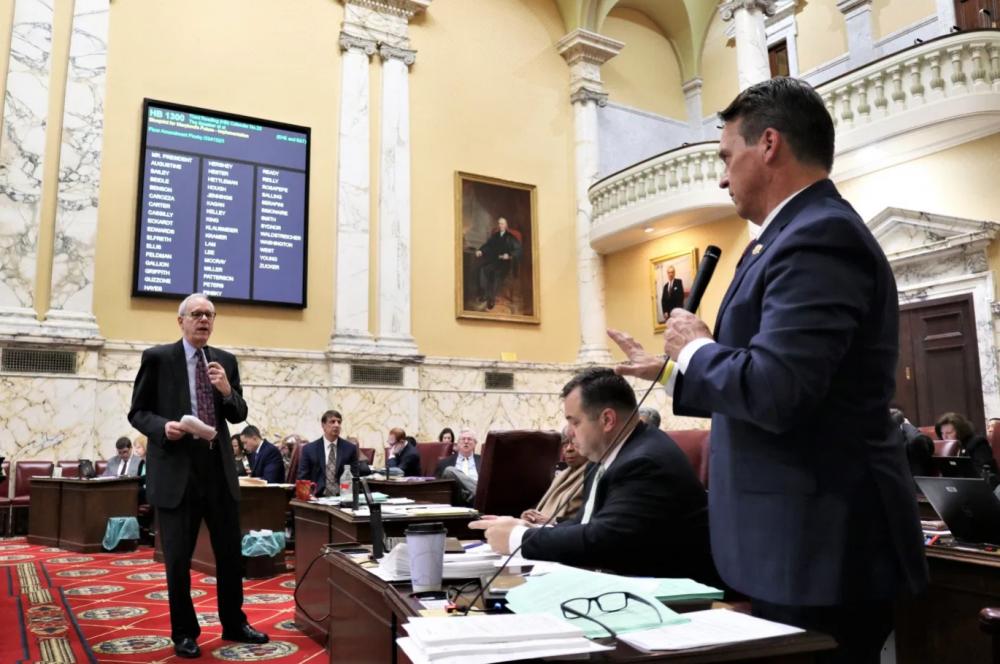After two and a half hours of debate, Maryland’s Senate passed the multi-billion dollar Blueprint for Maryland’s Future education recommendations to applause late Monday night.
The bill passed on a 37-9 vote.
Senate Education, Health and Environmental Affairs Committee Chairman Paul G. Pinsky (D-Prince George’s) said that it was not just the General Assembly or sitting members of the Commission on Innovation and Excellence in Education who made this bill’s passage possible, but the thousands of people who stepped up in the hope of changing the state’s educational system.
“I don’t believe in the ‘great man theory’ or the ‘great woman theory of history’ — I think the people make history, and I think this document was made by stories, and educators and parents from across the state who went into it saying what was working what wasn’t working, why we needed this,” he said.
Pinsky, who has been absent around the State House in recent days except for the blueprint debates, took a moment to thank the chamber for working with him as he handled the difficulties of caring for his wife, who is in the late stages of her pancreatic cancer diagnosis.
“It has been hard,” said Pinsky.
“Your blood family and the bigger family here has been very important to me. This will be my Sine Die and I appreciate everything you’ve done.”
Senate President Bill Ferguson (D-Baltimore City) embraced Pinsky as he left the chamber for the final time this session.
Sen. Bryan W. Simonaire (R-Anne Arundel), despite a difference of opinion and unease with the bill’s policy, thanked Pinsky for his work.
“I know he’s come here at great personal sacrifice to be with us tonight,” Simonaire said. “I know him and many others have put a lot of work into that. And while I may not agree on everything, I certainly want to publicly acknowledge all the work he’s done and everybody else.”
The education reform bill based on the recommendations of the long-running Kirwan Commission looks to increase funding for schools in low-income areas, expand preschool and job training programs and increase teacher pay while heightening training requirements for educators, among other measures.
The legislation now must go back to the House floor for final approval of the bill as amended by the Senate before it reaches the governor’s desk.
The bill’s debate during the lengthy floor session started with Pinsky, who introduced a series of amendments. Some were technical, others changed grant phase-in start dates and one simply renamed early childhood development centers after William E. Kirwan’s late wife.
Pinsky said he believes House lawmakers will “concur with,” allowing the bill to move onto the governor’s desk in light of the fact that two days remain in the session.
“Because we’re running out of time and we have 48 hours til we adjourn, there was an informal conversation with the House to try to see if we could get to resolve the differences,” said Pinsky on the floor late Monday night.
His amendments passed.
Senate Minority Leader J.B. Jennings (R-Harford and Baltimore County) introduced an amendment to minimize the student-to-teacher ratio in state public schools. Earlier attempts to amend the bill to limit class sizes by House and Senate Republicans were thwarted.
Pinsky said that Jennings’ amendment was “consistent with the bill,” and accepted it.
Other Republican lawmakers attempted to amend the bill to account for a range of concerns, including the removal of disruptive students and discrepancies with the bill’s accountability board, all of which failed.
Senate Majority Leader Nancy J. King (D-Montgomery) submitted an amendment to limit additional state and local aid consistent with the rate of inflation should December 2020 revenue estimates in the state drop at least 7.5% below their March projections.
The amendment submitted Monday evening was passed.
King had initially pushed an iteration of this amendment Saturday, noting a potential economic downturn related to the COVID-19 epidemic.
Despite the amendment’s ability to derail or delay the blueprint, Pinksy had declared it friendly.
The bill will be taken up by House lawmakers in the remaining hours of the session.
By Hannah Gaskill



Write a Letter to the Editor on this Article
We encourage readers to offer their point of view on this article by submitting the following form. Editing is sometimes necessary and is done at the discretion of the editorial staff.